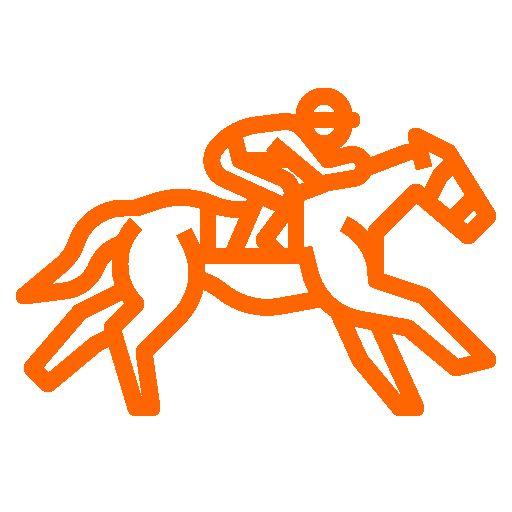Glossary L-O
L
Lay
To take a bet on: a bookmaker’s offer quoting the price at which he wishes to trade. ‘I’ll lay 6-4 this favourite.’ Betting on a horse to lose
Layer
An alternative term for a bookmaker, someone who lays or accepts a bet.
Left-handed track
Racecourse where horses run anti-clockwise.
Length
A unit of measurement for the distances between each horse at the finish of a race; the measurement of a horse from head to tail.
Level weights
When all horses are carrying the same weight. Major championship races, such as the Derby on the Flat or the Cheltenham Gold Cup over jumps, are run at level weights. There are still some allowances for age and sex (e.g. mares receive a 5lb allowance from male horses in the Cheltenham Gold Cup).
Listed Race
A class of race just below a Group or Graded quality.
Levy
A surcharge collected from bookmakers, based on their turnover or gross profits, which goes towards prize-money, improvements to racecourses, and other areas such as scientific research. The body responsible for this is the Levy Board.
Longshot
A horse with high odds (an outsider).
M
Maiden
A horse that has yet to win a race; maiden races are restricted to such horses, though sometimes the conditions of the race allow previous winners (e.g. maidens at closing, i.e. those that have not won a race up to the time the entries close), in which case penalties are allotted for later wins.
Maiden handicap
For maidens aged three or above that have run at least four times and have a maximum rating of 70.
Mare
Female horse aged five years old or above.
Market/betting market
A market is created, according to demand, by the prices offered for each runner by bookmakers.
Median auction maiden
A race for two-year-olds by stallions that had one or more yearling sold in the previous year with a median price not exceeding a specified figure.
Middle distances
On the Flat, races beyond a mile and up to 1m6f are the middle distances. A middle-distance horse is one that runs mainly over such distances or is regarded as being suitable for those distances.
Minimum trip
The shortest race distance: five furlongs on the Flat, two miles over jumps.
N
Neck
Unit of measurement in a race finish about the length of a horse’s neck.
Non Runner
A horse that was originally meant to run but for some reason has been withdrawn from the race.
Nose
Smallest official distance a horse can win by.
Non-trier
A horse that is prevented by the jockey from running to its full ability. Non-trying is a serious offence prohibited by the rules of racing, and jockeys (as well as the horse and owner) can be banned from racing if they are found guilty, while the horse’s trainer risks a fine and/or a ban.
Novice
A horse in the early stages of its career after it has won its first race.
Novice auction
A race for novices sold at public auction as yearlings or two-year-olds for a price not exceeding a specified figure.
Novice stakes
A Flat race for two-year-olds or three-year-olds that have not won more than twice.
Nursery
A handicap on the Flat for two-year-old horses.
Names
Horse names have to be registered with Weatherbys, racing’s administrative body, and are subject to approval. Names cannot be longer than 18 characters (including spaces) and must not be the same, in spelling or pronunciation, as a name already registered. In addition, there is a list of ‘protected’ horse names that cannot be used – these include past winners of big races such as the Grand National and the Classics on the Flat.
Nap
The best bet of the day from a particular tipster.
National Hunt
Racing over fences and hurdles; officially referred to as Jump racing.
O
Outsider
Long-priced horse in the betting, regarded as unlikely to win.
Overnight declarations
Horses entered for a race must be ‘declared to run’ and this usually happens the day before a race – horses left in a race at this stage are known as ‘overnight declarations’ and they comprise the final field for each race which appears on the day of the race in newspapers and in racecards. At this stage a trainer must also ‘declare’ the jockey who will ride the horse and any equipment (e.g. blinkers) the horse will carry – this information also appears on racecards in newspapers and at the racecourse.
Overround
In theory, a betting book can be fairly weighted between bookmaker and punter. However, to ensure a profit margin, a bookmaker will alter the odds in their favour. Overround is a means of expressing to what extent the odds are in favour of the bookmaker. An evenly weighted book is expressed as 100%, and the more the odds move in the bookmaker’s favour the more that figure rises. Thus a book that is weighted 20% in favour of a bookmaker is expressed as 120% overround.
Over the top
When a horse is considered to be past its peak due to too much racing/training and needs a rest.
Overweight
When a horse carries more than its allocated weight, due to the jockey being unable to make that weight. e.g. if a horse is allocated 9st in the handicap but carries 9st 2lb, the jockey is said to have ‘put up 2lb overweight’. This is usually a disadvantage, though sometimes the trainer of a horse may decide to accept overweight in order to have one of the best jockeys on board his horse.
Objection
A complaint by one jockey against another regarding the running of a race.
Odds
The chance offered for a selection to win. Also known as price.
Odds-against
Betting odds where the potential winnings are higher than the stake. The numerator is larger than the denominator (e.g. 2-1).
Odds-on
Betting odds where the stake is higher than the potential winnings if the bet is successful. The denominator is larger than the numerator (e.g. 1-2)
Off the bridle
Describes a horse being pushed along and losing contact with the bit in its mouth.
Off the pace
When a horse is some distance behind the front-runners in a race.
One-paced
Describes a horse that is unable to raise its pace in the closing stages of a race.
On the bridle
Describes a horse running comfortably, still having a bite on the bit. A horse that wins ‘on the bridle’ is regarded as having won easily.
On the nose (to bet)
Placing a win bet
Open ditch
Steeplechase jump with a ditch on the approach side to the fence.
Out of the handicap
When handicap races are framed, there is a maximum and minimum weight that horses can carry. When a horse’s rating means that its allocated weight is lower than the minimum for that race, it is said to be ‘out of the handicap’. e.g. in a Flat handicap where a horse set to carry the minimum weight of 7st 7lb is rated 65, a horse rated 62 would be allocated 7st 4lb in the long handicap but would have to carry the minimum 7st 7lb in the race – this horse would be described as being ‘3lb out of the handicap’ (i.e. it would be carrying 3lb more than its ‘true’ handicap weight).
Out of the Money
A horse that finishes outside of the place money.















